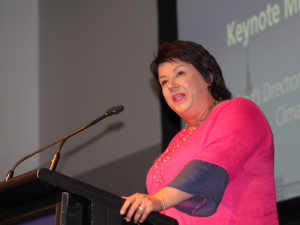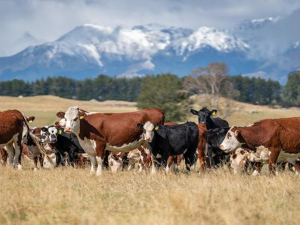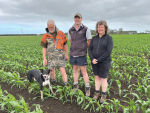New Zealand’s Paris target, of 30% reduction in 2005 emissions levels by 2030, is fair and ambitious, and will not be easy to reach, says Climate Change Minister Paula Bennett.
“It’s going to require some changes from all parts of society, but I have no doubt that New Zealanders are up for it,” she told a Climate Change and Business Conference in Auckland yesterday.
“We’re a nation that believes in and practices constant progress, even when people don’t realise it, and the next 18 months will be critical as we plan New Zealand’s response to climate change.
“Large parts of our plan are already underway, and our target will be met through a combination of domestic emissions reductions, removals of greenhouse gas emissions in the atmosphere by forests, and international carbon markets.
“The Government is currently looking at pulling together the various threads required to figure out a mix that works for our particular domestic circumstances.”
Day 1 of the conference started with speeches from France’s Ambassador to New Zealand, Florence Jeanblanc-Risler, and from Bennett, on the next stages of the Paris Agreement on climate change and the implications for New Zealand.
The ambassador, whose country’s diplomacy is credited with the successful negotiation of the Paris Agreement in December 2015, said it is critical that all aspects of society get involved in developing plans to reduce global emissions.
The Minister said the Government recognised the need for policy certainty and a comprehensive plan to reduce New Zealand’s emissions in line with the country’s Paris Agreement pledge (to cut emissions by 11% on 1990 levels by 2030), and said progress was being made on a cross-party consensus on climate change policy.
Diplomats and international experts outlined approaches being taken in other countries, with emphasis on the actions of the world’s largest emitters, China, the United States and the European Union.
The Ministry for the Environment’s director of climate change, Kay Harrison, says the current review of the Emissions Trading Scheme is a chance to fix mistakes in the original design to the scheme and prepare it for the Paris Agreement, which comes into force in 2021. She stressed the need to take it slowly and get it right, and said officials will be seeking more input from businesses and other organisations.
A discussion on the operation of the ETS focussed largely on the future supply of carbon credits, as New Zealand and other countries are relying on the ability to purchase credits internationally to meet their Paris Agreement pledges. There was also a good deal of discussion on how New Zealand should deal with biological emissions from agriculture, which make up nearly half New Zealand’s total emissions profile.
Examples from the real world saw businesses outlining how they are cutting emissions – Ikea has installed 700,000 solar panels on the roofs of its buildings, NZ Bus is converting its fleet of diesel buses to electricity, Fonterra is using heat recovery to avoid using more coal, and Countdown is using natural refrigeration to cut emissions and LED lights to slash energy consumption (and cutting 40% off its energy bill).











